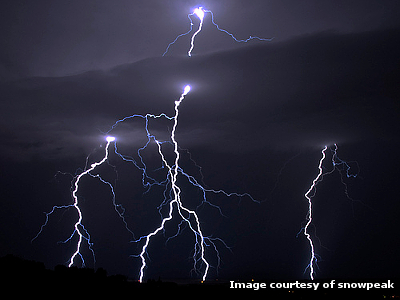You could talk about your work, an idea, a problem, a pitch for the CW Hackday or anything that's related to software and research, and ideally related to the software credit theme of CW16; alternatively you could focus on one of the sub-themes of collaborative working, data/code sharing,reproducible research or data science.
If you would like to present a lightning talk, let us know. You need to provide a title and a couple of sentences to describe the talk.
How quick is lightning?
Lightning is pretty quick: two minutes. You are also allowed only one slide or video. Neither slide nor video should require any interaction once put up or started. You'll be presenting alongside a countdown timer, so you'll have to keep to time. However, it's amazing how much you can present in two minutes.
If you want more time to investigate your subject, let us know and we will try and add it to our series of discussion sessions.
Lightning talks top tips
If you are preparing a lightning talk for CW16 please take a read of our handy tips. Remember CW16 is going to attract people who are interested in both software and research, so tailor your talk to meet their needs.
Session 1
On Monday 21 March 2016, 10:25-11:00.
- CW16 : Open by Robert Davey. (Video)
- Reproducible science and research software by Sean McGeever. (Video)
- Some advice from my blog... by Robin Wilson. (Video)
- What do we know about RSEs? by Simon Hettrick. (Video)
- Making things easy to start with by Martin Jones. (Video)
- What is Critical Data Studies? by Heather Ford. (Video)
- Library Carpentry and other things by James Baker. (Video)
- Docker Container for GAP by Olexandr Konovalov. (Video)
- Academic Software Jobs by Mario Antonioletti. (Video)
- CamFort: automated evolution and verification for computational science by Matthew Danish. (Video)
- TeSS Training Portal by Niall Beard. (Video)
Session 2
On Monday 21 March 2016, 11:30-12:00.
- Putting myself out of a job by Swithun Crowe. (Video)
- Persistent Identification of Software: a building block to citation & curation by Catherine Jones. (Video)
- Software Credit through accreditation? by Craig MacLachlan. (Video)
- A paper with a large number of authors to ensure credit for software by Vince Knight. (Video)
- A rant about email by David Perez-Suarez. (Video)
- Tackling fusion data silos by Alys Brett. (Video)
- Sound tools for real-time audio tasks by Amy Beeston. (Video)
- Open Source Research Software Guidelines by Mateusz Kuzak. (Video)
- Introducing "Shit Data" by Iza Romanowska. (Video)
- BoneJ2 - migrating with ImageJ2 by Richard Domander. (Video)
Session 3
On Monday 21 March 2016, 13:00-14:00.
- ChemBio Hub - a flexible research data management platform by Karen Porter. (Video)
- Instant mess by Raniere Silva. (Video)
- The BioJS Open Source Library of Data Representation Web Components by Manuel Corpas. (Video)
- Libre Graphics Meeting 2016 by Larisa Blazic. (Video)
- Big Data' tools and HPC: Heaven or Hell? by Martin Callaghan. (Video)
- Reproducible Computer Science by Caroline Jay. (Video)
- What the REF? by Neil Chue Hong. (Video)
- The SKA Challenge by Nick Rees. (Video)
- The UK RSE Conference and AGM 2016 by Robert Haines. (Video)
- BioSchemas by Niall Beard. (Video)
- Nekkloud: Spectral/hp element analysis on clusters and clouds by Jeremy Cohen. (Video)
- Fine-grained citations with CWL tool descriptions by Michael Crusoe. (Video)
- A Programme for the Development of Computational and Digital Research Capacity in South Africa and Africa by Anelda van der Walt. (Video)
- What is qLegal? by Clemenze Tanzi. (Video)
- Accident and Emergency of Research Software Engineering by Mike Croucher. (Video)
- What goes into a Software Carpentry workshop by Jonah Duckles. (Video)

